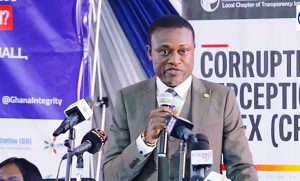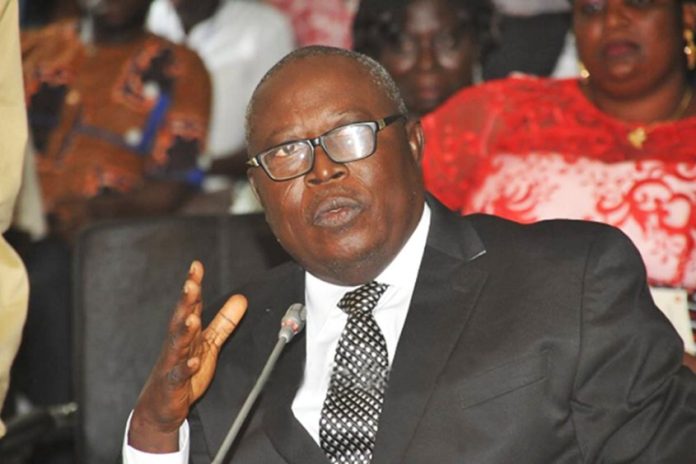A recent IMF Technical Assistance Report on Ghana’s Governance Diagnostic Assessment (2024), sighted by The Chronicle, has raised serious concerns about the country’s anti-corruption framework, warning that fragmentation, overlapping mandates, political interference and chronic underfunding are undermining the effectiveness of key anti-corruption bodies, especially the Office of the Special Prosecutor (OSP).
According to the report, Ghana’s institutional setup for fighting corruption is “characterised by governance weaknesses” that have led to duplication of roles, weak legal powers and limited operational independence among agencies such as the CHRAJ, EOCO and the OSP.
OSP and CHRAJ Mandates Overlap
The IMF found that the mandates of the OSP and the Commission on Human Rights and Administrative Justice (CHRAJ) overlap significantly, creating “confusion and legal uncertainty.”
While CHRAJ is empowered to investigate “corruption” – a term not clearly defined in Ghana’s legal framework, the OSP is mandated to handle “corruption and corruption-related offences”, as defined under Section 79 of its enabling Act.

In practice, the report said, CHRAJ refers complaints involving possible criminal elements to the OSP, but “there are no protocols or criteria in place,” leading to duplication and inefficiency. Both agencies also carry out corruption prevention activities without coordinating with each other, even though the OSP legally holds that mandate.
“This fragmentation has led to split funding streams and blurred responsibilities,” the report noted, urging the government to clearly define the jurisdictions of CHRAJ, OSP, EOCO and the Attorney-General’s Department.
Political Influence in Appointments
The report highlighted that the Office of the President wields significant control over the appointment and removal of heads of anti-corruption institutions, including the OSP, a situation that “could compromise their independence.”
Although the Special Prosecutor and Deputy require parliamentary approval, the IMF observed that “this safeguard remains weak” since Ghana’s presidents have historically enjoyed majority control in Parliament.
The IMF called for stronger appointment criteria, transparent procedures, and protection from arbitrary dismissal for anti-corruption agency heads.
It recalled that the resignation of Ghana’s first Special Prosecutor in 2020 who cited “executive interference” reflected deeper structural vulnerabilities.
“The OSP must not only have, but be seen to have, meaningful operational independence from the Executive,” the report emphasised.
Underfunding Cripples Anti-Corruption Work
Beyond political interference, the IMF found that chronic underfunding and lack of financial autonomy have severely limited the effectiveness of Ghana’s anti-corruption bodies.
Despite legal provisions stating that these agencies should be independent, the Ministry of Finance retains significant control over their budgets and recruitment.
Agencies “cannot hire staff or make payments without clearance” from the ministry, the IMF observed.
Between 2016 and 2023, anti-corruption institutions received only about 51 percent of their approved budget allocations, on average. The OSP, in particular, “did not receive the full sums appropriated” in its early years after establishment, which “undermined its operational independence.”
The IMF urged Parliament to adopt legislative safeguards to guarantee full disbursement of funds allocated to accountability institutions.
Weak Legal Powers and Enforcement
The report further noted that CHRAJ lacks binding powers to enforce its findings, since its decisions are “purely investigative and educational.”
Meanwhile, gaps in Ghana’s conflict of interest and asset declaration laws have created weak accountability structures, with no obligation to verify or publish officials’ declarations.
The IMF also faulted the slow implementation of the Right to Information (RTI) Act, saying that broad exemptions and weak enforcement limit transparency and access to information that could expose corruption.
OSP’s Operational Challenges and Performance Gaps
The IMF acknowledged that the OSP has strong legal powers under its 2017 Act to investigate and prosecute corruption-related crimes, but said the office lacks the tools and personnel to exercise them effectively. It reported shortages of staff, equipment, and forensic capacity, warning that these constraints “could mean the difference between a case being successful or not.”
While the OSP’s website lists some ongoing and completed cases, the IMF said it was unclear how many cases have been investigated, prosecuted, or successfully concluded and how often the information is updated. “Successful high-level prosecutions are not common,” it noted, urging the OSP to adopt clear policies on case prioritization and transparency.
The IMF also recommended the introduction of a Charging Code for OSP prosecutors, a structured decision-making guide used in countries like the UK to ensure consistency and improve conviction rates in corruption cases.
The IMF concluded that Ghana’s fight against corruption will remain ineffective unless the roles, powers, and funding mechanisms of anti-corruption agencies are clearly defined and protected from executive control.
“Ultimately, it will be important for the future effectiveness of the anti-corruption framework that there is a clear division of responsibility between the OSP, the Attorney-General, EOCO, the police and CHRAJ and that this division is reflected in corresponding budget allocations,” the report advised.









